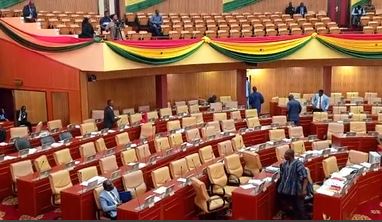The Ghanaian Parliament witnessed a dramatic walkout by the Minority caucus on Thursday, July 17, sparked by comments made by Majority Leader, Mahama Ayariga, concerning the yet-to-be-declared vacant Akwatia parliamentary seat following the demise of MP Ernest Yaw Kumi. The incident unfolded during parliamentary proceedings when Ayariga questioned Speaker Alban Bagbin about the timeline for officially declaring the seat vacant, referencing a recent visit by parliamentary leadership to the late MP’s family where the death was acknowledged. Ayariga pointedly questioned the Clerk of Parliament’s awareness of the situation, emphasizing the legal requirement to notify the Electoral Commission within seven days of becoming aware of a vacancy. He highlighted the Clerk’s meeting with the deceased’s family, broadcast on national television, as further confirmation of the MP’s passing, seemingly advocating for a swift declaration of the vacancy.
Speaker Bagbin, in response, clarified Parliament’s position, stating that official protocols required formal communication from the bereaved family before the seat could be declared vacant and the Electoral Commission notified. This position adhered to established parliamentary procedures and emphasized the need for sensitivity and respect during a period of mourning. He emphasized the necessity of respecting the family’s grieving process and awaiting their formal communication before initiating any parliamentary procedures related to the vacancy. This highlighted the delicate balance between following official protocols and showing empathy towards the grieving family.
The situation escalated when Ayariga alleged that the New Patriotic Party (NPP), the party of the deceased MP, had already begun circulating campaign posters featuring the late MP’s widow, Mavis Kumi, as a potential candidate for the anticipated by-election. This allegation, made in the context of questioning the delay in declaring the seat vacant, introduced a political dimension to the sensitive issue of the MP’s passing. The Minority vehemently opposed Ayariga’s statement, interpreting it as a premature and insensitive politicization of a period of mourning, thereby disrespecting the deceased MP and his family.
The Minority’s strong reaction underscored the delicate nature of the situation. Their walkout was a powerful demonstration of their disapproval of Ayariga’s comments, which they perceived as disrespectful to the deceased MP and his family. They viewed his remarks as an attempt to exploit a tragic event for political gain, thereby undermining the solemnity of the occasion and the respect due to the bereaved family. This perception ultimately led to their decision to stage a walkout.
This parliamentary incident highlights the complex intersection of legal processes, political maneuvering, and cultural sensitivities surrounding the death of a sitting MP. The differing perspectives on the timing and handling of the vacancy declaration reflect the inherent tensions within a parliamentary system, where adherence to legal procedures often occurs alongside political strategizing. The incident also underscores the importance of respecting the grieving process of bereaved families while navigating the necessary administrative and political procedures.
The walkout by the Minority served as a poignant reminder of the need for sensitivity and decorum in the face of loss, especially within the political arena. It underscored the importance of separating political considerations from matters of grief and respect for the deceased. The incident also raised questions about the appropriate conduct of parliamentary members during sensitive situations, highlighting the need for a balance between fulfilling their legislative duties and maintaining respect for human dignity and bereavement. The subsequent public discourse and media coverage further amplified these considerations, bringing the debate about appropriate political conduct under intense scrutiny.














